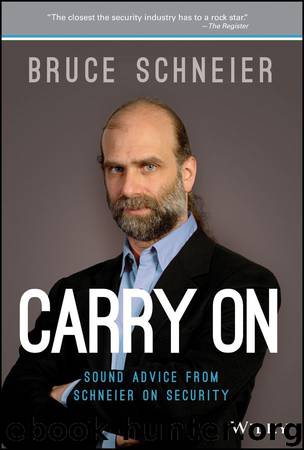Carry On: Sound Advice From Schneier on Security by Bruce Schneier

Author:Bruce Schneier
Language: eng
Format: mobi
Tags: Networking, Computers & Technology, Network Security, Security & Encryption, Computer Science
ISBN: 9781118790816
Publisher: Wiley
Published: 2013-12-15T18:00:00+00:00
Google's and Facebook's Privacy Illusion
Originally published in Forbes, April 6, 2010
In January, Facebook CEO, Mark Zuckerberg, declared the age of privacy to be over. A month earlier, Google Chief Eric Schmidt expressed a similar sentiment. Add Scott McNealy's and Larry Ellison's comments from a few years earlier, and you've got a whole lot of tech CEOs proclaiming the death of privacy—especially when it comes to young people.
It's just not true. People, including the younger generation, still care about privacy. Yes, they're far more public on the Internet than their parents: writing personal details on Facebook, posting embarrassing photos on Flickr and having intimate conversations on Twitter. But they take steps to protect their privacy and vociferously complain when they feel it violated. They're not technically sophisticated about privacy and make mistakes all the time, but that's mostly the fault of companies and Web sites that try to manipulate them for financial gain.
To the older generation, privacy is about secrecy. And, as the Supreme Court said, once something is no longer secret, it's no longer private. But that's not how privacy works, and it's not how the younger generation thinks about it. Privacy is about control. When your health records are sold to a pharmaceutical company without your permission; when a social-networking site changes your privacy settings to make what used to be visible only to your friends visible to everyone; when the NSA eavesdrops on everyone's e-mail conversations—your loss of control over that information is the issue. We may not mind sharing our personal lives and thoughts, but we want to control how, where and with whom. A privacy failure is a control failure.
People's relationship with privacy is socially complicated. Salience matters: People are more likely to protect their privacy if they're thinking about it, and less likely to if they're thinking about something else. Social-networking sites know this, constantly reminding people about how much fun it is to share photos and comments and conversations while downplaying the privacy risks. Some sites go even further, deliberately hiding information about how little control—and privacy—users have over their data. We all give up our privacy when we're not thinking about it.
Group behavior matters; we're more likely to expose personal information when our peers are doing it. We object more to losing privacy than we value its return once it's gone. Even if we don't have control over our data, an illusion of control reassures us. And we are poor judges of risk. All sorts of academic research backs up these findings.
Here's the problem: The very companies whose CEOs eulogize privacy make their money by controlling vast amounts of their users' information. Whether through targeted advertising, cross-selling or simply convincing their users to spend more time on their site and sign up their friends, more information shared in more ways, more publicly means more profits. This means these companies are motivated to continually ratchet down the privacy of their services, while at the same time pronouncing privacy erosions as inevitable and giving users the illusion of control.
Download
This site does not store any files on its server. We only index and link to content provided by other sites. Please contact the content providers to delete copyright contents if any and email us, we'll remove relevant links or contents immediately.
Kotlin in Action by Dmitry Jemerov(19376)
Grails in Action by Glen Smith Peter Ledbrook(16816)
Sass and Compass in Action by Wynn Netherland Nathan Weizenbaum Chris Eppstein Brandon Mathis(14301)
Configuring Windows Server Hybrid Advanced Services Exam Ref AZ-801 by Chris Gill(7522)
Azure Containers Explained by Wesley Haakman & Richard Hooper(7515)
Running Windows Containers on AWS by Marcio Morales(7067)
Microsoft 365 Identity and Services Exam Guide MS-100 by Aaron Guilmette(5451)
Microsoft Cybersecurity Architect Exam Ref SC-100 by Dwayne Natwick(5291)
Combating Crime on the Dark Web by Nearchos Nearchou(5046)
The Ruby Workshop by Akshat Paul Peter Philips Dániel Szabó and Cheyne Wallace(4720)
Management Strategies for the Cloud Revolution: How Cloud Computing Is Transforming Business and Why You Can't Afford to Be Left Behind by Charles Babcock(4563)
Python for Security and Networking - Third Edition by José Manuel Ortega(4298)
The Age of Surveillance Capitalism by Shoshana Zuboff(4275)
Learn Windows PowerShell in a Month of Lunches by Don Jones(4194)
Learn Wireshark by Lisa Bock(4192)
Ember.js in Action by Joachim Haagen Skeie(4080)
The Ultimate Docker Container Book by Schenker Gabriel N.;(3938)
DevSecOps in Practice with VMware Tanzu by Parth Pandit & Robert Hardt(3628)
Windows Ransomware Detection and Protection by Marius Sandbu(3601)
